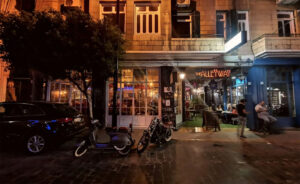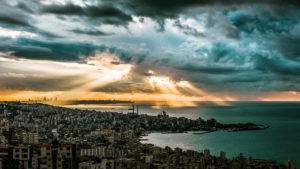Victim #232 is a new novel in Arabic by author Joumana Haddad, forthcoming in July 2022 in Arabic, from Naufal Books. The novel follows the life and ordeals of Hind, a young trans woman in Lebanon, whose life is cut short by the Port explosion in Beirut on August 4, 2020. Yet not only is Hind’s life cut short, but also the novel itself —a book where reality and fiction, writer and protagonist intertwine to the point where they become one.
It is the fourth day of August of the year two thousand and twenty. It is six o’clock eight minutes and eighteen seconds into the evening in a city named Beirut.
This is when my novel stalled. This is when my heroine died.
How do writers go about announcing the death of their protagonists? I suppose one could choose to go with the usual pre-scripted announcement that begins with “In submission to God’s decree and predestination, we mourn the demise of our dearly beloved whose young life was lamentably cut short, etc …” I suppose that could work. But what if this person’s life hadn’t been fated to end so soon? What if “fate” and “predestination” are stand-ins for a heinous crime?
I know writers — a substantial many — who have no qualms killing off their characters once they believe that they have reached their limit: either by suicide in some romantic novels, or in a war in historical ones, or by a sudden heart attack, or any other of the thousands upon thousands of possible ways out there that come with their own thousands upon thousands of convincing and justifiable reasons for such a move. But I know not of a single writer whose main character is terminated against their will and better judgement, without having any say in the matter. And there’s worse yet. I know not of a single writer whose main character’s death takes place as the result of an “outside of the novel” event! Essentially, what happens due to such a heinous, incredulous state of affairs boils down to nothing short of a betrayed writer.
How many were killed in the August 4, 2020 explosion in the port of Beirut? Many sources confirm that up until April 4, 2022 – the date of placing the final full stop at the end of the last sentence of this novel – the count stood at 231 victims, the last of whom was Rita Antoine Hardini, who died on the evening of Saturday, March 26, 2022, succumbing to her excruciating injuries after approximately one year and eight months on artificial respiration.
Everyone agrees that this number is not final, as many individuals remain unaccounted for. Victims scattered, in pieces, at sea, alluding the efforts and hopes of search parties desperate to locate them. Then there are the wounded, the living dead, who may, perish the thought, yet make it onto the martyrs’ list.
And yet, the Lebanese Ministry of Health decided to cease the count on September 3, 2020 locking the number in at 191. After all, it would seem that to our “illustrious” government and its “venerable” institutions and their “honorable public servants” counting out and writing down all the names is a long and arduous process. Besides, how could adding one more name or even subtracting one other possibly make a difference to a government who looks upon its congregation as a mere figurative number devoid of individuality or value? A number, mind you, that is substantially insignificant to the ones that make up the value of our leaders’ bank accounts and the sums they hold, the billions they looted from the people and smuggled abroad. A number definitely not as important as that of their “entitled” positions such as parliamentary seats, ministerial portfolios, public office jobs, military rankings, and others, that each of these supposedly “outstanding public servants” accord themselves depending on their “weight” in our country – the sordid sway they have to disrupt and/or intimidate this unfortunate land. A number not even as significant as the one that makes up their luxury cars (the smaller the number on the plate, the bigger the boost to their paltry egos), the count of their black jeeps with darkened windows paraded in endless processions, nor the bodyguards and members of their entourage, the nonstop ass lickers and strutters, who indulge them. Like all unlawful bandits they share the spoils and yet unlike the worst of those thieves, they rob lives. Shame on them!
No matter! Moving along. It’s also not uncommon for the media to round up the numbers of the injured, or killed, when reporting on any disaster, thereby adding insult to injury. When an article or televised news bulletin reports that an explosion killed more than two hundred people, does the esteemed editor realize that excluded victim #201 may be a son to a mother whose heart has been eternally crushed? Does the broadcaster understand that #202 may be a father to a child who will never again address his “daddy”? Does it occur to any one of them that #203 had been someone’s girlfriend, or sister? They are not a number. I repeat, they are not mere numbers. The least we can do about the death of the innocent is to honor them individually rather than lob them into one shameful collective.
So, again, how many people were killed in the August 4, 2020 explosion in the Port of Beirut? Regardless of the number you choose to believe, I urge you to add one more. Her name was Hind.
Hind, or Abbas as recorded in her official government ID card, was born in the village of Blida in southern Lebanon in April 1996, on a day that, according to her mother Inam, coincided with the first Qana massacre. She was young with big dreams, living hand to mouth within limited means. At six o’clock, seven minutes and forty-three seconds on Tuesday, August 4, 2020, she appeared on my computer screen, knocking on a door in a dilapidated building in a modest neighborhood in the capital. At that precise moment, an initial explosion occurred in the port, the sound of which could be heard in the entire vicinity of Beirut, its echoes reverberating all the way to the outskirts of the city. Exactly thirty-five seconds later, according to the timeline of events on Wikipedia, a second, apocalyptic, ominous explosion occurred, killing Hind Jaber on the spot. Only seconds before, she’d been about to greet her neighbor, Tygest, and for the first time in her life, she’d been ecstatic with joy after receiving news that she would finally escape the hellish life she was living. “Tomorrow,” she was happily reassuring herself, “would be another day.” Alas, that tomorrow would never come for Hind, nor any other. Our tomorrows, too, have diminished to replaying out that infernal day like a broken record stuck on notes of lamentation.
To be clear, I’m not surprised you hadn’t ever heard of this victim’s name before today, neither in newspapers nor on the radio or TV. I am the only one who knew Hind. No one has ever heard of her or met her. No one knew her secrets, thoughts and dreams.
When the artist, Brady Black, drew pictures of the victims and hung them in the center of Beirut – like Abel’s eyes staring at the conscience of a serial killer – I uselessly scrolled each one in the hope of locating Hind’s beautiful face even though I already knew she wouldn’t be among them, cognizant she lay shrouded in my conscience where no more harm could ever again reach her. And yet, if I’d known how to draw, I would’ve placed her sketch nestled between those of the two victims I’m certain would have embraced her and eased her pain: that of four-year-old Alexandra, and fifteen-year-old Elias, the two faces that sum up all those staring back at me and whose smiles reside in the house of my tears.
Indeed, no one knew Hind except me. No one reported her disappearance or announced her death. With no body found it was as if she never were. But she was. She really was. Just ask me! You see, I created her, cell by cell and inch by inch, through the images in my mind and the clicks of my fingers. I’ve been there from when she was a baby crawling towards its demise, to the embodiment of the woman she would later fully realize. Hind, the trans woman who despite her short life had lived her fair share of aches and pains, repeatedly “killed” because she was different. A state not of her choice, but rather, imposed on her by a society so terrified of difference that it cowardly chooses hatred, ostracism, bullying, and racism to deal with its fear and ignorance. Hind, who loved Dalida, Sabah and Rushdi Abaza, and hated war, loud voices and labneh sandwiches. She, of the meagre means who loved the color pink and always dreamt of gliding over the sea, was battered by life. Yet, bruised and bloodied she still chose love and helping those in need.
Chance — although quite possibly objectivity or serendipity — would have it that the temporary title I had chosen for my novel had been Al-Maslakh (The Slaughterhouse). On the one hand it was in reference to the name of the neighborhood in which Hind lived, and on the other, it stood as a painful metaphor for those countries that relentlessly slough flesh off our bones and hope from our souls. Was I being prescient? Was I following a hunch? Was I cursed? I cannot say. All I know is that all along my plan was for Hind to triumph over life’s repeated flayings. I wanted for her both an end and a beginning, in which she would finally able to break free from the grip of an unjust society. And yet, it was not destined to be. Hind slipped out of the trappings of my imagination, only to fall into the clutches of a cruel and painful reality.
I’ll share with you another terrible coincidence. The Al-Maslakh neighborhood, which as I’d mentioned before, I’d chosen as my protagonist’s neighborhood, is in fact a real place, located in an area called Karantina, facing the Port of Beirut. Subsequently, after the devastating and criminal August 4 explosion, it was one of the hardest hit neighborhoods in Beirut. I’d chosen this particular area precisely because of a personal childhood memory which took place during the time of the Lebanese Civil War, when a militiaman forcefully broke into our apartment, located on the fifth floor of a building overlooking the Charles Helou highway, at the beginning of Armenia Street in Bourj Hammoud, from the side of the Beirut River. Our balcony boasted the best view out onto most of the Karantina. I was barely six years old at the time, and before my mother, amidst the chaos, fear, and confusion, dragged me into the safety of the interior rooms of the apartment, I saw with my own eyes how the sniper stationed himself in the right corner of our balcony and started taking aim before opening fire on those below. Later, from my parents’ whispers, I was able to gather that he had been hunting down the Palestinians within the Karantina neighborhood.
It wasn’t until I was an adult that I read of the horrific massacres that had taken place in that area in 1976, at the hands of the Phalanges and other rightwing Christian militias, and that I was able to connect the dots to fully understand that the damned sniper who had invaded our balcony had been one of those criminals.
Little by little and the more I learnt of the atrocities that had taken place against hundreds of innocent people during that time, a feeling of guilt would seize me, a guilt that although subtle and buried deep inside of me, was as incessant and loud as a moth’s flapping wings. I knew, even then, that it was irrational and illogical, but that knowledge did nothing to assuage my anxiety. The guilt persisted, as if I myself, or someone in my family, had been pulling the trigger that day. I still can’t pass the building in which I grew up in without looking up and seeing the ghost of that killer crouched on our balcony.
I spit on that war and all others, as I think of the stench they leave in their wake. A putridness we are unable to shed no matter how hard we each try to expel the demons that fester within us.
In short, my choice of the Al-Maslakh neighborhood was not random. Aside from the fact that I am very drawn — one could say “exclusively” drawn — to the worlds of the marginalized and the oppressed in life, especially the female ones, and that it is from the latter that I draw my energy and inspiration, the choice of Al-Maslakh is also my attempt to atone for this invented, imagined and delusional guilt. It could also be an excuse to satisfy my pathological, narcissistic and urgent need to be directly and personally involved in my books. This, if you will, is the fuel that ignites my writing. In fact, all my works to date have been a series of either personal excavations into my internal psyche or attempts to atone for my sins — deserved or not — with some endeavors more successful than others.
I’d like you to linger with me a little while longer on the word ‘slaughterhouse’ — Doesn’t it seem a befitting word to describe the events on August 4th? Some things never seem to change, do they? Two massacres, forty-five years apart, and almost nothing changed on this land. The grudges, the misery, the disappointments and the dodgy deals haven’t changed, neither has the exorbitant price that tags along with them – the exclusive stake, it would seem, for the downtrodden and innocent to bear. Different sides of the same coin: a geographical curse called Lebanon.
Besides, isn’t the entire country, in fact, nothing but a successful metaphor for a large slaughterhouse covering an area of 10,452 square kilometers? Look and observe: one day you’ll find us hanging from hooks by the millions, old and young, women and men, the sage and the ignorant, forests and rivers, towns and cities, surrounded exclusively by butchers.
It is the fourth day of August of the year two thousand and twenty. It is six o’clock eight minutes and eighteen seconds into the evening in a city named Beirut.
This is when the main character dies. This is when the author steps into her novel.
The moment the harrowing disaster struck, the writer had been at home. A house on a street parallel to the Ring crossroad, less than a kilometer away from the Port of Beirut. In a flash, the house seemed to disintegrate all around her and it seemed as if her soul would follow suit. Immediately, the world became one made of a million shards of broken glass, black dust, and twirling wooden doors raining down on everyone. It was sheer unadulterated terror. A brief daunting silence ensued before throats clogged with shock, released wave upon wave of howls that were accompanied by the cacophony of blaring car sirens. The writer placed her hands above her head and screamed, “There’s more, there’s more,” initially assuming that the capital was under an aerial bomb attack.
Finally the writer found the strength to get up and she ran, panicked, to check on her loved ones. Luckily, her family members had made it out alive. As she phoned friends and family, she was told that a massive explosion had taken place.
It was then that she stepped outside her apartment.
What she witnessed were tens, hundreds, thousands of men, women and children stumbling around the streets, with dazed faces, trying, like her, in vain, to understand what? How? And why? She glimpsed a head missing its torso peaking from the wreckage. A little girl’s head, perhaps, in a final smile at her mother. Childhood terrors of living through the country’s Civil War assaulted her thoughts. That child could have been her, this head could have been hers. But, yet again, forty-five years on, she’d been spared. “Why?” she thought “And for what purpose?” if surviving, in Lebanon, meant a tragic farcical masquerade at living.
She tries to fight the memory down and yet it refuses to release its grip on her mind. It feels as if two hands were relentlessly pulling at a noose, tightening around her neck. For a split moment, she is on the point of suffocating before the hands still and she is left in limbo, suspended between two hells.
Eventually the writer returned to what was left of her home. She looked around, grabbed a broom and started sweeping. She does not know whether she is scraping up shards of glass, or ashes from her burnt out soul, or the taste of death lingering on her tongue. For now, it is the only thing she can do to come to terms with the horror that has taken place lest something explode inside her and kill her. Later, she would realize that when everyone had grabbed their brooms and taken to the streets, they too had done so out of an instinct for survival that drove them to keep busy, keeping the intensity of their emotions at bay, lest it completely overwhelmed and destroyed them.
Following the first weeks of the explosion, after the people of Beirut managed to crawl their way out of the harrowing pit they’d been thrown into (although, whether some of us are willing to admit it or not, in reality no one has truly been able to free themselves completely from under the rubble and human remains), the writer plugged in her computer and switched it on. Imagine her surprise when she discovered that no harm had befallen it. She located The Slaughterhouse file where she’d saved it on her desktop. She’d begun writing, or birthing, this novel about a year ago, yet slowly and painstakingly, as if unwilling to share her baby with the world yet. It wasn’t until the revolution of October 17, 2019 that her writing picked up drive when she, and many others like her, were charged with an energy born of a collective sense of hope.
She clicked on the Word document and settled herself in front of the screen, ready to write. It may have been hours that she sat there, motionless, that day. Time spent staring at the last paragraph she’d written before everything had gone to Hell, the last word truncated in its middle staring back at her. Hours more passed. “What are you waiting for?” she asked herself. Was she hoping for a sign from Hind? “Hey, Joumana,” she’d say, “I’m here. Come on! let’s get on with my story. There’s yet so much I need to say and do.” And, yet, except for the lingering deathly stillness, like the one that overcomes a deer at the moment it knows it is going to be killed by the leopard lunging towards it, nothing was happening.
In the days that followed, the writer would do much of the same. A daily ritual in which she’d sit, open her laptop, and wait. Not once did she reach for the keyboard, or muster enough courage to complete the truncated word, where it remained diminished, a glaring proof of the blow that had stalled its completion midway much like a shriek cut short, suspended in time. A dividing line between what was before and what came after the crime: the slow death, the piercing despair, and the complete darkness.
One night bleeding into another.
And so it was that for what seemed like the longest time, the writer waited for her silent character to speak, all the time persisting in the belief that Hind may yet be alive — for no person deserved to die in that way. Moreover, the writer was unwilling to give up her protagonist or to let her go without a fight. And so, in a bid to reach some kind of resolution, she tried several other things in addition to denying Hind’s death: she even tried to perform mouth-to-mouth to breathe new life into her protagonist’s lungs. But alas, all her efforts proved fruitless and it gradually dawned on her that Hind, in fact, might be gone forever. And with this realization, the betrayed writer had to begrudgingly lay her character to rest and bid farewell to the only member of her family who perished in the explosion that day.
It was during the writer’s mourning period that she realized that Hind, in fact, not only stood in for the part of her that had died too on August 4, 2020 but that she also represented Beirut, or at least the part of Beirut that had died on that fateful day which no amount of reconstruction could ever bring back, nor any phoenix rise from its ashes, and no Lebanese, could, however eternally resilient they are famed to be, evoke a resurrection.
With her death, Hind had taken away the part of the writer’s heart that had created her, making it impossible to complete the book. After a year and eight months, drained of oxygen, energy, physical, psychological, and mental capacity, the writer had no alternative but to concede defeat, and admit that the novel would only ever exist in the world as a truncated one, an amputee.
And so with that, completion of this novel falls to you, the reader, to drive it towards an ending that your imagination or mood sees fit. And why not? We are all born deficient, amputees in one form or the other, adrift, severed from and deprived of who we really are or could have been. We come into existence on this Earth without will or say, each of us bearing our death within us. All the time ticking like a time bomb. Like Ammonium Nitrate.
April 4, 2022.
Here this story ends, or more accurately, here new ones begin .
See you then in the next novel.



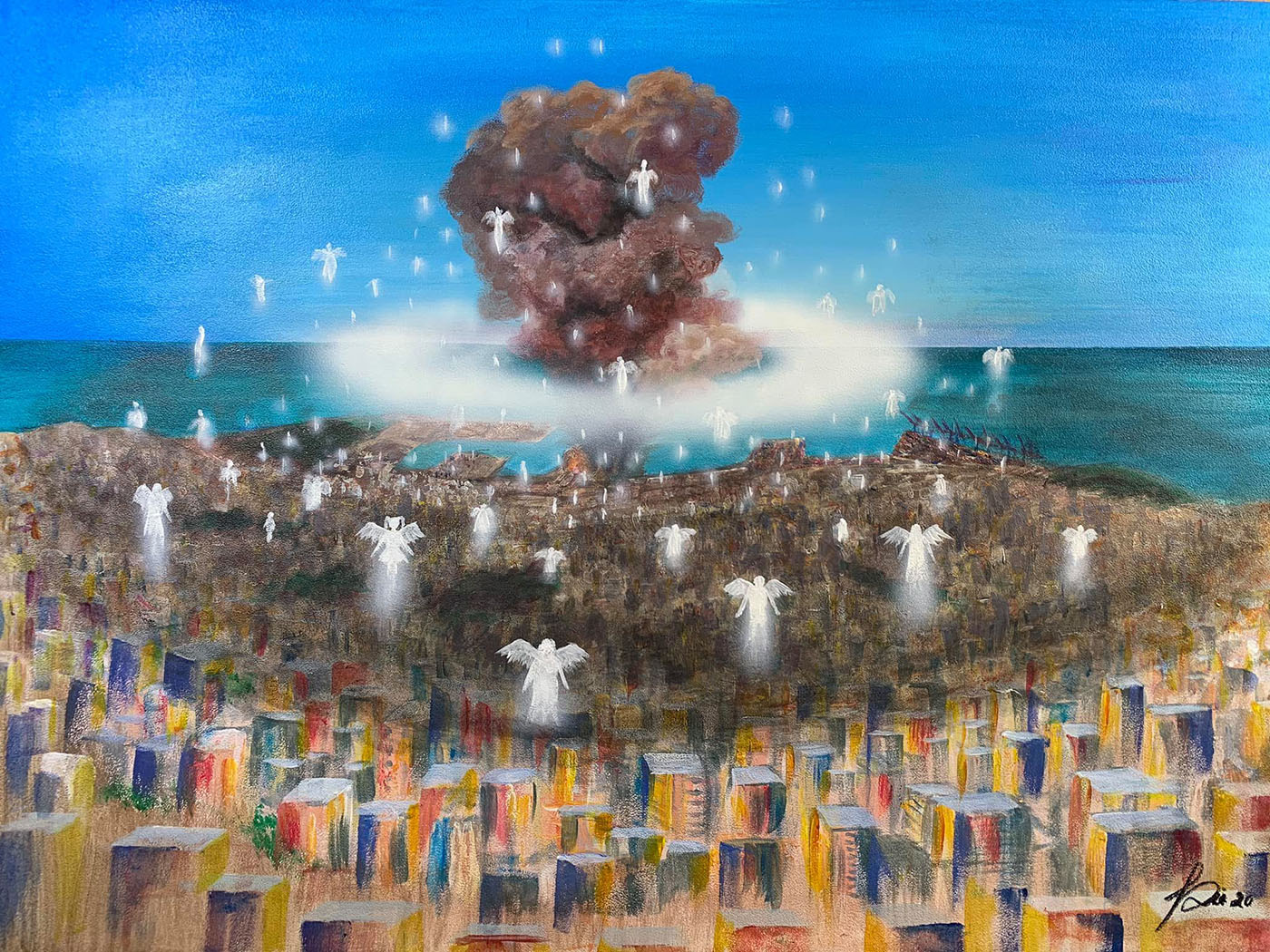
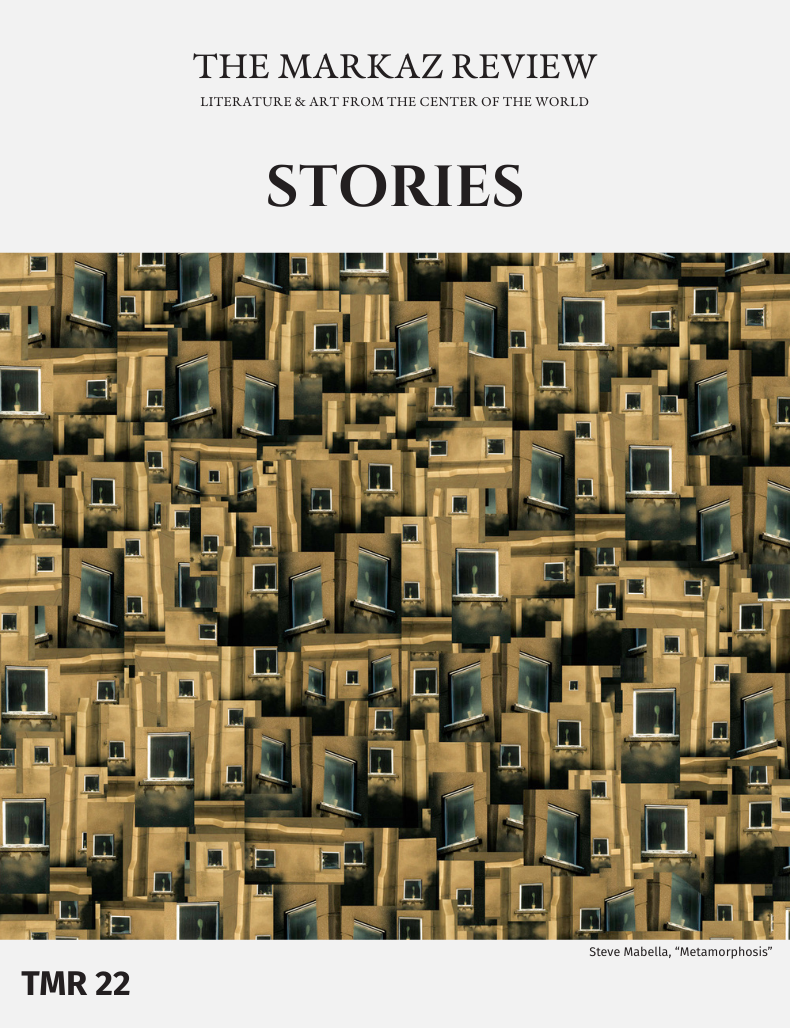
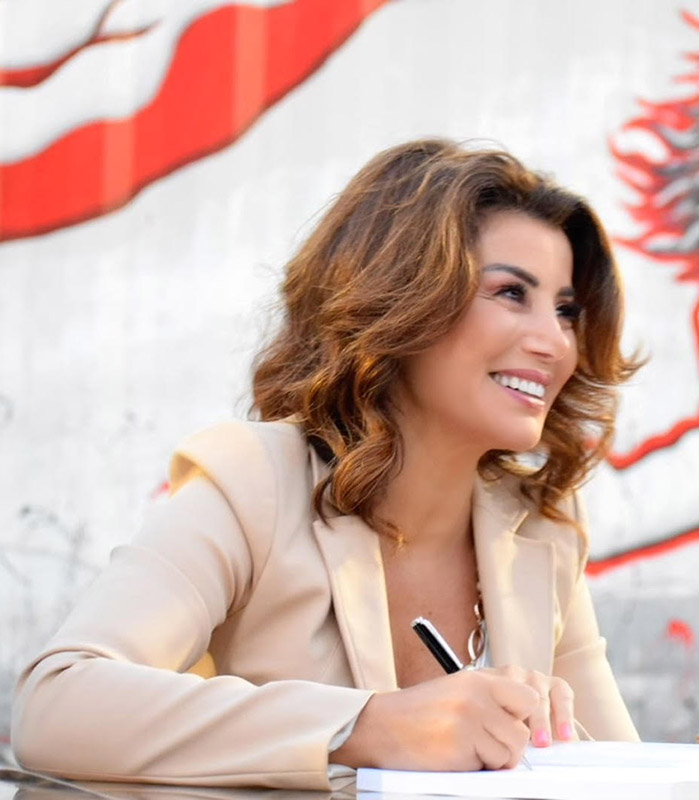

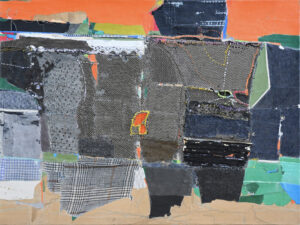



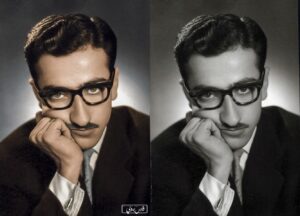


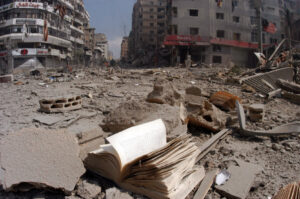



![Ali Cherri’s show at Marseille’s [mac] Is Watching You](https://themarkaz.org/wp-content/uploads/2025/09/Ali-Cherri-22Les-Veilleurs22-at-the-mac-Musee-dart-contemporain-de-Marseille-photo-Gregoire-Edouard-Ville-de-Marseille-300x200.jpg)





































